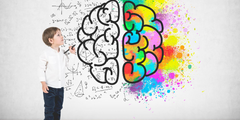What Has the Most Critical Impact on a Developing Brain?
A question that has been asked of me several times is whether I think there is one aspect of early brain development that I feel is most critical for Brain Insights to place an emphasis. When considering this, the area that immediately comes to mind is the understanding of the significance of nurturing responsive relationships.
 This is not the only area that is important and I will address this, but the first and primary need of a baby is to establish a trust in someone that aids in survival and a feeling of security. The infant is helpless and needs to establish a connection to someone that will consistently and lovingly respond to expressed needs. When needs are met repeatedly and predictably in a timely and nurturing way a feeling of security results. These repeated experiences as, in this example, actually creates physical connections between neurons and to a critical extent contribute to an essential foundation in the brain toward success in life.
This is not the only area that is important and I will address this, but the first and primary need of a baby is to establish a trust in someone that aids in survival and a feeling of security. The infant is helpless and needs to establish a connection to someone that will consistently and lovingly respond to expressed needs. When needs are met repeatedly and predictably in a timely and nurturing way a feeling of security results. These repeated experiences as, in this example, actually creates physical connections between neurons and to a critical extent contribute to an essential foundation in the brain toward success in life.
These early relationships and important resulting connections have a very real impact on physical and mental health, behavior, learning and self-perception.
The most advanced “thinking area” of the brain for controlling impulses, abstract thinking, planning and anticipating consequences all begin development through predictable, nurturing, respectful and responsive relationships. The need of every baby to receive the nurturing they require is the reason, the Nurturing a Newborn Set was developed.
There is a wealth of valuable research on the crucial impact of responsive caregiving and establishing a secure attachment. Additional longitudinal research conducted at the Institute of Child Development University of Minnesota, reveals in-depth findings to support what previous studies have shared on this important topic.
“… {the] study suggests that parents may want to focus on one major influencer: sensitivity during a child's first few years. Researchers argue that a kid's social and academic abilities can be stifled all the way into adulthood if they don't receive sensitive caregiving.
According to the researchers, sensitive caregiving is "the extent to which a parent responds to a child's signals appropriately and promptly, is positively involved during interactions with the child and provides a secure base for the child's exploration of the environment." In other words, it's interacting with a child in a gentle, attentive way that shows the caregiver understands the child's needs.”
~Study Pinpoints One Big Factor In A Child's Early Life That Can Have A Lasting Impact: The Huffington Post by Rebecca Adams
So, clearly the influence of early relationships is extremely significant. This topic definitely needs broader awareness and greater understanding. So in answering the question posed…
Promoting the impact and understanding of the extremely significant need for nurturing responsiveness, especially in the first 2 months, is where I place the main focus of the work of Brain Insights. However, as a child develops, beyond the need for nurturing relationships, several other areas of importance are also emphasized.
Developing brains require….
- Lots and lots of unstructured time for exploring, imagining, climbing, trial and error, creativity, roughhousing, pretending, singing, daydreaming, running, laughing, jumping, experimenting, splashing and cuddling.
- A wealth of direct caring and fun interactive serve and return communication experiences, that includes a broad vocabulary and frequent experiences of having songs sung, stories told and books read.
- Nutritious foods daily, starting with a very healthy breakfast that includes adequate amounts of protein and very few simple carbohydrates. Essential fatty acids and hydration are also extremely important to a growing brain.
- A daily routine and consistency. A daily routine needs to include lots of time for child directed play and plenty of sleep at about the same time each day.
- An abundance of time to move freely and time in nature.
- Co-regulation with a calm, understanding and empathetic adult.
- Adults that understand development.

With all of this in mind, in support of you as a parent or professional, I have created a list of resources on early brain development and parenting. There are numerous books that are favorites, but this is a sample of valuable ones that cover the range of topics that I have listed above as contributing to the brain nurturing experiences that all children deserve.
(Click on the titles below to link to these wonderful resources)
The Blossom Method
A Moving Child is a Learning Child: How the Body Teaches the Brain to Think
You Are My World
Inspired Children
Elevating Childcare: A guide to respectful parenting
Stress Free Kids
The Science of Parenting
Zero to Five
Cure Your Child with Food
Last Child in the Woods
The Hurried Child
How to Talk So Kids will Listen & Listen so Kids Will Talk








Be the first to comment